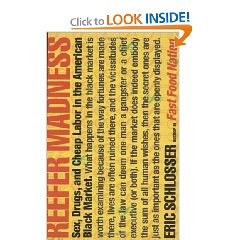Edit of 22 Dec 07 to add links.
This is an utterly extraordinary book, and I am going to review it not from the point of view of fast food as a vice, like tobacco, with individual health consequences, but rather from a national security point of view, with obesity and the loss of the warrior ethic, of fitness, of the ability to run down and kill terrorists in your neighborhood. Strategically, in both political and economic terms, this book is a *major* contribution to how politicians, corporate chiefs, university and school administrators, religious leaders, and individuals themselves should think about their national diet.
In combination with “Pandora's Poison” by Joe Thorton (a book about how chlorine-based chemistry is killing both America and the Earth), this book cuts to the very innermost corners of the national soul.
It is also more timely, in 2003, than when first published in 2001 to such acclaim, because a book called “Why People Hate America” has ably documented the Islamic and general foreign perception of how McDonald's embodies the “hamburger virus” of capitalism run amok, and Kraft Food, among others, had just recently (July 2003) announced that it is completely revisiting its edibles, now that folks are realizing that Oreo's kill kids and sodas have ten tea-spoons of sugar in every can. Food has become a fighting matter! Food has become a cultural litmus test, and America is failing the test.
We have also seen SARS, monkeypox, and multiple re-emerging infectuous diseases since this book was published. Infected fast food is a clear and present danger to the American nation.
What I find so dazzling about this work is its thoughtful integration and explanation of how fast food not only increases the gap between the rich and the poor by killing family farms and skilled labor as fast food corporations take over both farms and animal food chains so as to de-skill them and extract every penny of profit possible, but it is increasing the prospects for deadly disease entering the national bloodstream. If Microsoft is a “Dutch Elm disease” threat to national security in cyberspace (a view published in ComputerWorld by Paul Strassman recently after leaving his post as Director of Defense Information), then McDonalds and the other fast food companies are a threat to national security in multiple ways–by destroying diversity among farms and in eating habits that support unique food chains, by increasing the numbers of people in poverty, by creating massive means by which several different nation-wide epidemics could occur.
Obesity is actually the least threatening outcome of a political economy that permits fast food (and still does not regulate and enforce healthy meat processing).
At every level, from the philosophical architecture of the book, with its concern about the targeting of children as both direct clients and intermediaries in getting parents to accept bad food for their whining children, to the selection of the topics to be covered by the individual chapters, to the earnest and richly-developed sources that are quoted, this is one of the finest books among the 375 plus that I have reviewed here on Amazon.
This book is beyond five stars. In relation to poverty, corporate corruption, government ineffectiveness, fast food as a disease vector, and in relation to obesity as a symbol of a nation in decline, this book is about as important as a book can get. Totally, totally awesome. It's not about diet–its about the health of the American Republic in every way conceivable.
See also:
The Blue Death: Disease, Disaster, and the Water We Drink
Betrayal of Trust: The Collapse of Global Public Health




